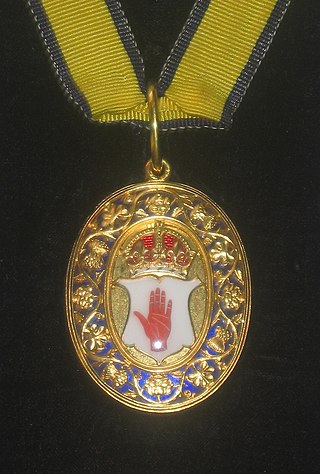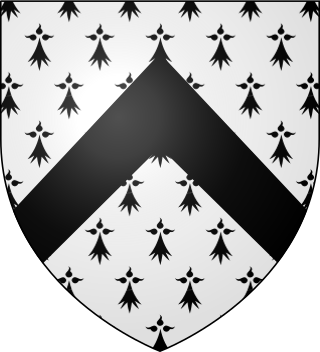
A baronet or the female equivalent, a baronetess, is the holder of a baronetcy, a hereditary title awarded by the British Crown. The title of baronet is mentioned as early as the 14th century; however, in its current usage it was created by James I of England in 1611 as a means of raising funds for the crown.

Baron ffrench, of Castle ffrench in the County of Galway, is a title in the Peerage of Ireland created on 14 February 1798 for Rose, Lady ffrench. She was the widow of Charles ffrench, who had been created a Baronet, of Clogha in County Galway, in the Baronetage of Ireland on 17 August 1779. Their son Thomas succeeded in both the baronetcy and barony. Both titles have descended via primogeniture to the present Baron.
Baron Gainford, of Headlam in the County Palatine of Durham, is a title in the Peerage of the United Kingdom. It was created on 3 January 1917 for the Liberal politician Jack Pease, a member of the Darlington Pease family. He notably served as President of the Board of Education from 1911 to 1915. Pease was the second son of Sir Joseph Pease, 1st Baronet, and the grandson of Joseph Pease, while Arthur Pease was his uncle and Sir Arthur Pease, 1st Baronet, Beaumont Pease, 1st Baron Wardington, and Herbert Pease, 1st Baron Daryngton, were his first cousins. The third baron was a former member of the London County Council and of the Greater London Council. As of 2013 the title is held by his younger brother, the fourth baron, an architect and town planner; County Planning Officer for Ross and Cromarty 1967–1975 and Scottish Office Inquiry Reporter 1978–1993.

Baron Avebury, of Avebury in the County of Wiltshire, is a title in the Peerage of the United Kingdom. It was created 22 January 1900 for the banker, politician and archaeologist Sir John Lubbock, 4th Baronet. He was succeeded by his eldest son, the second Baron. On his death the titles passed to his nephew, the third Baron. He was the son of Harold Fox Pitt Lubbock, fourth son of the first Baron, who died in 1971. The title then passed to the third Baron's first cousin, the fourth Baron, the son of Maurice Fox Pitt Lubbock, sixth son of the first Baron. The fourth baron was a Liberal Democrat politician and one of the ninety excepted hereditary peers who remained in the House of Lords after the passing of the House of Lords Act 1999. He was succeeded by his son, the fifth Baron, in 2016.

Baron Shuttleworth, of Gawthorpe in the County Palatine of Lancaster, is a title in the Peerage of the United Kingdom. It was created on 15 July 1902 for the Liberal politician Sir Ughtred Kay-Shuttleworth, 2nd Baronet. Both his sons were killed in the First World War and he was therefore succeeded by his grandson, the second Baron. However, both he and his brother, the third Baron, were killed in action during the Second World War. On the death of the third Baron in 1942 the titles passed to his first cousin, the fourth Baron, who survived the Second World War although he was badly wounded. As of 2017 the titles are held by the latter's son, the fifth Baron, who succeeded in 1975. He has been Lord Lieutenant of Lancashire since 1997.
Baron Maclay, of Glasgow in the County of Lanark, is a title in the Peerage of the United Kingdom. It was created in 1922 for the Scottish businessman Sir Joseph Maclay, 1st Baronet. He was Chairman of Maclay & Macintyre, shipowners, of Glasgow, and also served as Minister of Shipping in the war-time coalition of David Lloyd George, without being in Parliament. Maclay had already been created a Baronet, of Park Terrace in the City of Glasgow in the County of Lanark, in 1914. His eldest surviving son, the second Baron, represented Paisley in the House of Commons as a Liberal. As of 2010 the titles are held by the latter's eldest son, the third Baron, who succeeded in 1969.

Baron Tredegar, of Tredegar in the County of Monmouth, was a title in the Peerage of the United Kingdom. It was created on 16 April 1859 for the Welsh politician Sir Charles Morgan, 3rd Baronet, who had earlier represented Brecon in Parliament. His eldest son, Charles Rodney Morgan, sat as Member of Parliament for Brecon, but predeceased his father. Lord Tredegar was therefore succeeded by his second son, the second Baron.

There have been two baronetcies created for persons with the surname Burnett, one in the Baronetage of Nova Scotia and one in the Baronetage of the United Kingdom. As of 2010 one creation is extant while one is dormant.
There have been four baronetcies created for people with the surname Hoare, one in the Baronetage of Ireland, one in the Baronetage of Great Britain and two in the Baronetage of the United Kingdom. The second holder of the third creation was raised to the peerage as Viscount Templewood in 1944.

There have been four baronetcies created for persons with the surname Rose, all in the Baronetage of the United Kingdom. Three of the creations are extant as of 2010.
There have been six baronetcies created for persons with the surname Brooke, one in the Baronetage of England, one in the Baronetage of Ireland and four in the Baronetage of the United Kingdom. As of 2015 four of the creations are extant, though one has been subsumed into a peerage.

There have been twenty one baronetcies created for persons with the surname Williams, eight in the Baronetage of England, three in the Baronetage of Great Britain and ten in the Baronetage of the United Kingdom. Only six of the creations are extant as of 2017.
Sir Archibald Woollaston White, 4th Baronet, MFH, was the son of William Knight Hamilton White, the second son of Sir Thomas White, 2nd Baronet. He was born at Tickhill in Yorkshire, where he lived throughout his childhood. He succeeded to the baronetcy upon the death of his uncle, Sir Thomas White, 3rd Baronet, in 1907.
The Dalrymple-White Baronetcy, of High Mark in the County of Wigtown, is a title in the Baronetage of the United Kingdom. It was created on 28 July 1926 for the soldier and Conservative politician Godfrey Dalrymple-White. As of 2007 the title is held by his grandson, the third Baronet, who succeeded his father in 2006.

There have been two baronetcies created for persons with the surname Boothby, both in the Baronetage of England. One creation is extant as of 2022.
The Master of the Rolls in Ireland was a senior judicial office in the Irish Chancery under English and British rule, and was equivalent to the Master of the Rolls in the English Chancery. Originally called the Keeper of the Rolls, he was responsible for the safekeeping of the Chancery records such as close rolls and patent rolls. The office was created by letters patent in 1333, the first holder of the office being Edmund de Grimsby. As the Irish bureaucracy expanded, the duties of the Master of the Rolls came to be performed by subordinates and the position became a sinecure which was awarded to political allies of the Dublin Castle administration. In the nineteenth century, it became a senior judicial appointment, ranking second within the Court of Chancery behind the Lord Chancellor of Ireland. The post was abolished by the Courts of Justice Act 1924, passed by the Irish Free State established in 1922.

There have been two baronetcies created for persons with the surname Tichborne, both in the Baronetage of England. Both creations are extinct.
Sheriff of Dublin City was a judicial and administrative role in Ireland. Initially, the Sovereign's judicial representative in Dublin, the role was later held by two individuals and concerned with a mix of judicial, political and administrative functions. In origins, an office for a lifetime, assigned by the Sovereign, the Sheriff became an annual appointment following the Provisions of Oxford in 1258.
Sir Thomas Henry Elliott, 1st Baronet, was an English civil servant. Having entered the Inland Revenue Department in 1872, he rose to be permanent secretary to the Board of Agriculture and Fisheries (1892–1913), and Deputy Master and Comptroller of the Royal Mint (1913–1917).










